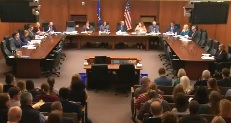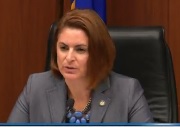MN Lawmakers Flex Political Muscle and Reject Union Contracts

You heard it here first. State public employee unions and the Dayton Administration can no longer count on state legislators to be a rubber stamp for negotiated labor agreements, as American Experiment noted several weeks ago. At the time, DFL lawmakers were troubled when some colleagues raised uncomfortable questions about a SEIU Healthcare Minnesota contract stemming from a controversial 2014 union election for home care workers.
Now the majority on the Legislative Coordinating Commission’s Subcommittee on Employee Relations has sent another blunt message to the state’s two biggest public employee union collective bargaining units. The lawmakers recently voted six to four on a party-line vote to reject a two-year deal covering nearly 30,000 state employees in AFSCME and the Minnesota Association of Professional Employees.
The results were not received well by the minority, according to the Session Daily.
Sen. Chris Eaton (DFL-Brooklyn Center) said it’s pretty much “immoral” not to approve the contracts.
Rep. Debra Hilstrom (DFL-Brooklyn Center) noted a July 21 tweet from O’Neill about being “pleased with the outcome” after House Speaker Kurt Daudt (R-Crown) agreed to higher salaries for House members. Those increased from $31,140 to $45,000 after a recommendation from a legislative salary council.
“We are talking about 2 and 2 1-2 percent,” Hilstrom said. “… This is shameful.”
The Star Tribune editorial board didn’t appreciate the outcome any better, warning some government workers might go over to the dark–private–sector side.
It also shows that in the current political environment, it doesn’t take a state budget deficit — or an election year — for state employees to feel a compensation squeeze. That squeeze could prove costly for taxpayers in the long run, if it makes attracting and retaining a skilled workforce more difficult in an increasingly tight labor market. Already, it’s taking more than three months to fill many state positions, state officials report.
Yet House and Senate subcommittee leaders prevailed after raising reservations about the union deal that Dayton’s Department of Minnesota Management and Budget negotiated on the backs of taxpayers.
The legislative panel’s chair, Rep. Marion O’Neill of Maple Lake, offered a more nuanced explanation for Republican “no” votes. The Dayton administration supplied too little evidence that the new contracts would be affordable within the confines of the state agency budgets the Legislature approved in May. Agency-by-agency information was lacking, she told an editorial writer. She also voiced concern that the contracts would lead to tuition increases or program cuts in the Minnesota State Colleges and Universities system, where about 4,800 employees would be covered by the two new contracts.
The proposed raise for Department of Human Services employees would burn up $22 million of the $31 million of increased operating funds for the next biennium, leaving little for other priorities. Sen. Michelle Benson (R-Ham Lake) suggested going back to the drawing board.
“These are good, fair and affordable contracts,” said Edwin Hudson, deputy commissioner of MMB’s Enterprise Human Capital Division. He said health cost savings will help offset the increases.
But with health-care cost uncertainty nationally and in Minnesota, Benson said those dollars may not continue to exist. “You’re writing checks you don’t know we can pay.”
Round One goes to the Subcommittee on Employee Relations. For now, thousands of state government employees will continue to work and be paid under their old contract, until the legislature reconvenes in February.